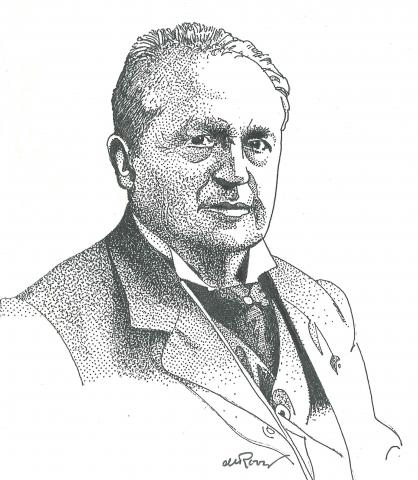De Standaard [1 (1872)], no. 1, April 1, 1872–73 (1944/1945), no. 21959, December 15, 1944.
Published: April 1, 1872–December 15, 1944.
RKB 41.
After numerous attempts by several parties—especially C. Schwartz, who founded De Heraut in 1850—to found a Protestant Christian political newspaper (see 1869.12), Kuyper succeeded on April 1, 1872 with the publication of De Standaard. In the first issue, the editor expressly took note of the fact that the new paper was commencing publication on precisely the same day that the Dutch struggle for independence had begun 300 years earlier with the capture of Den Briel by the Geuzen [Sea Beggars].
De Heraut continued to be published as an ecclesiastical weekly under the new name De Standaard. Zondagsnummer [The Standard: Sunday Edition], which likewise first appeared on April 1, 1872 and was published from April 5, 1874 to May 27, 1877 under the name Zondagsblad van De Standaard. Beginning on December 7, 1877, this Zondagsblad continued to be published as De Heraut (see 1877.05).
De Standaard can be considered a rebirth of Mr. G. Groen van Prinsterer’s daily De Nederlander (no. 1, July 1, 1850–no. 1538, June 29, 1855). Alongside the daily leading articles, article series, and other contributions, Kuyper also wrote the so-called “three stars,” or “asterisms,” which were short editorials or commentaries about contemporary events. An idea taken from the “occasional notes” in British newspapers (or from G. Groen van Prinsterer), these asterisms were printed in columns and named after the three asterisks printed next to heading of the column. Kuyper penned approximately 16,800 asterisms for De Standaard. The first asterism marked as such appeared on March 1, 1875 and the last on December 18, 1919, by which time he had already ceased making regular contributions for health reasons (cf. 1989.01). The final asterism deals respectfully with a fellow journalist, L.J. Plemp van Duiveland, chairman (1911–1920) of the Dutch Association of Journalists and editor in chief of the Nieuwe Courant, who had also had to put aside his work for health-related reasons. The first and the final of these columns were reprinted in 1922.01 and were also included among the 429 asterisms reprinted in 1932.08.
The paper began printing its title line in blackletter on April 1, 1889. This blackletter format stayed in place up to and including the final issue—De Standaard 73 (1944/1945) no. 21959, December 15, 1944. For special issues of De Standaard, see 1922.01 and 1937.05; for reprints (including a reprint of the first issue), see 1972.01. Concerning the numbering of the volumes, see 1911.07.
Apart from a few interruptions, Kuyper remained the editor in chief of De Standaard until November 9, 1920. De Standaard was not a financial success during the period of Kuyper’s ownership (1887–1916) and several infusions of capital were required to keep it afloat over the years. Several facts and figures relating to the paper are given below.
| Circulation: |
| 1882 |
2,500 |
| 1911 |
3,700 |
| 1918 |
11,500 |
| 1937 |
24,000 |
| 1940 |
26,240 |
| 1943 |
34,091 |
| 1944 |
19,325 |
| Owner of De Standaard: |
| 1872–1874 |
The Heraut Association (in 1874 The Heraut Association retained ownership of the Zondagsblad) |
| 1874–1880 |
De Nederlandsche Stoomdrukkerij (from October 1874, the Koninklijke Nederlandsche Stoomdrukkerij) |
| 1880–1887 |
J.H. Kruyt |
| 1887–1916 |
A. Kuyper |
| 1916–1944 |
N.V. De Standaard |
| Editor in chief: |
| April 1, 1872–November 9, 1920 |
Dr. A. Kuyper |
| July 14, 1927–October 1, 1939 |
Dr. H. Colijn (who subsequently served as the chief political editor from October 2, 1939—August 29, 1940 and then as the politically responsible editor in chief from August 30, 1940–February 5, 1941) |
| May 8, 1941–December 15, 1944 |
T. Cnossen and then H. Burger |
| Publisher: |
| 1872–1874 |
H. de Hoogh & Co. |
| 1874–1887 |
J.H. Kruyt |
| 1887–1897 |
J.A. Wormser |
| 1898–1907 |
(N.V.) Boekh. vh Höveker & Wormser |
| 1907–1916 |
J.W. Reese en R.C. Verweijck |
| 1916–1944 |
N.V. De Standaarddrukkerij |
| Printer: |
| 1872–1874 |
De Nederlandsche Stoomdrukkerij |
| 1874–1893 |
Koninklijke Nederlandsche Stoomdrukkerij |
| 1894–1898 |
Electrische Drukkerij voorheen J.J. Arnd & Zonen |
| 1898–1913 |
Fa. De Roever Kröber & Bakels |
| 1913–1944 |
N.V. De Standaarddrukkerij |
| Format: |
| 1872–1873 |
48cm. |
| 1873–1903 |
54cm. |
| 1903–1944 |
60cm. |
Already reduced to a single issue per week due to wartime rationing, the final issue (vol. 73, no. 21959) appeared on December 15, 1944. On May 5, 1945, the first issue of the newspaper Trouw (previously distributed through an underground network) was printed on the presses of the suspended De Standaard. The print run of Trouw amounted to 312,650 by September 1945. An attempt to revive De Standaard after World War II as a weekly paper with the subtitle Anti-Revol. politiek-cultureel weekblad [Anti-revolutionary political-cultural weekly] (editor in chief: T. Cnossen) lasted from November 30, 1946 (73 [1946], no. 21960) to July 26, 1947 (74 [1947], no. 21992). |
| Subscription rate: |
| 1872 |
quarterly |
subscription |
ƒ2.27 5, |
postage- |
paid |
ƒ2.75 |
(incl. Zondagsnummer) |
| 1873 |
,, |
,, |
ƒ2.60, |
,, |
,, |
ƒ2.95 |
(incl. Zondagsnummer) |
| 1874–1918 |
,, |
,, |
ƒ2.50, |
,, |
,, |
ƒ2.90 |
| 1874–1877 |
,, |
,, |
incl. Zondagsblad, postage paid ƒ3.20. |
|
,, |
,, |
only to the Zondagsblad, postage-paid: ƒ2.- |
| 1918–1919 |
,, |
,, |
ƒ2.75, |
postage- |
paid |
ƒ3.15 |
| 1920 |
,, |
,, |
ƒ3.05, |
postage- |
paid |
ƒ3.45 |

